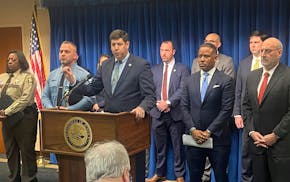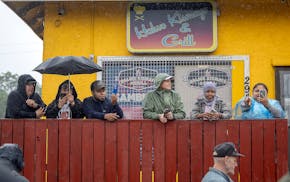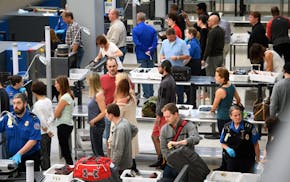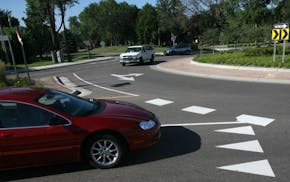Derek Chauvin's legal team will be permitted to examine heart tissue and fluid samples taken from George Floyd's autopsy for an appeal of the former Minneapolis officer's federal civil rights conviction based on a medical theory that Chauvin did not cause Floyd's death.
U.S. District Judge Paul Magnuson on Monday granted a motion from Chauvin to inspect the evidence as part of a claim that a heart condition, and not Chauvin's knee on Floyd's neck, killed Floyd during a May 2020 police encounter that sparked widespread civil unrest.
Chauvin, who is serving state and federal prison sentences in excess of 20 years, is seeking to overturn his 2022 federal civil rights conviction over "ineffective assistance of counsel." Chauvin is arguing that his original defense attorney, Eric Nelson, failed to inform him that a forensic pathologist based in Topeka, Kan., told Nelson he did not think Chauvin caused Floyd's death.
Chauvin added that Nelson failed to seek testing of heart tissue samples that Dr. William Schaetzel believed would show evidence of a heart condition called takotsubo cardiomyopathy.
"Given the significant nature of the criminal case that Mr. Chauvin was convicted of, and given that the discovery that Mr. Chauvin seeks could support Dr. Schaetzel's opinion of how Mr. Floyd died, the Court finds that there is good cause to allow Mr. Chauvin to take the discovery that he seeks," Magnuson wrote in Monday's order.
Magnuson wrote that Chauvin's defense team may take discovery of any histology slides of Floyd's heart, tissue samples of his heart, tissue blocks containing heart tissue from Floyd and recut sections of all autopsy tissue slides relating to his heart.
Chauvin's lawyers are also allowed to inspect and make copies of any photographs taken of Floyd's heart and they can take quantities of certain fluids for testing.
Nelson no longer represents Chauvin, and did not immediately respond to a request for comment. Chauvin's appeal is now being handled by Robert Meyers, an assistant federal defender in Minneapolis.
Magnuson sentenced Chauvin in July 2022 to more than 20 years in federal prison for violating Floyd's civil rights. A Hennepin County judge sentenced Chauvin to a similar term after a jury there found him guilty of murder. Chauvin pleaded guilty in his federal case. His plea included an agreement not to challenge his sentence except under a claim of ineffective assistance of counsel.
Assistant U.S. Attorney LeeAnn Bell and Special Litigation Counsel Samantha Trepel, two prosecutors who led the government's case against Chauvin, asked Magnuson to deny Chauvin's motion that claims he received deficient performance by Nelson.
In an August brief filed in the case, Bell and Trepel described Schaetzel's email to Nelson as an "unsolicited opinion from a doctor who had seen [Chauvin's] state trial on television." The prosecutors argued that Nelson's decision not to share that email with Chauvin did not violate Chauvin's rights surrounding his decision to eventually plead guilty but instead was a "tactical decision by counsel not to further explore an untested (but in any event cumulative) opinion offered by someone holding himself out as an expert."
Though an attorney has a duty to consult with their client regarding "important decisions" such as overarching defense strategy, the prosecutors wrote, they need not consult on "every tactical decision."
Magnuson nevertheless greenlit another examination on Floyd's tissue and fluid samples because, he wrote, they could support Schaetzel's opinion of how Floyd died.

Five members of Minneapolis Highs street gang found guilty of racketeering conspiracy

Midea recalling 1.7 million of its popular air conditioners due to mold concern

Social media, text chains helped anti-ICE protesters get the word out during Minneapolis raid

TSA agents seize two loaded guns on the same day at MSP Airport
